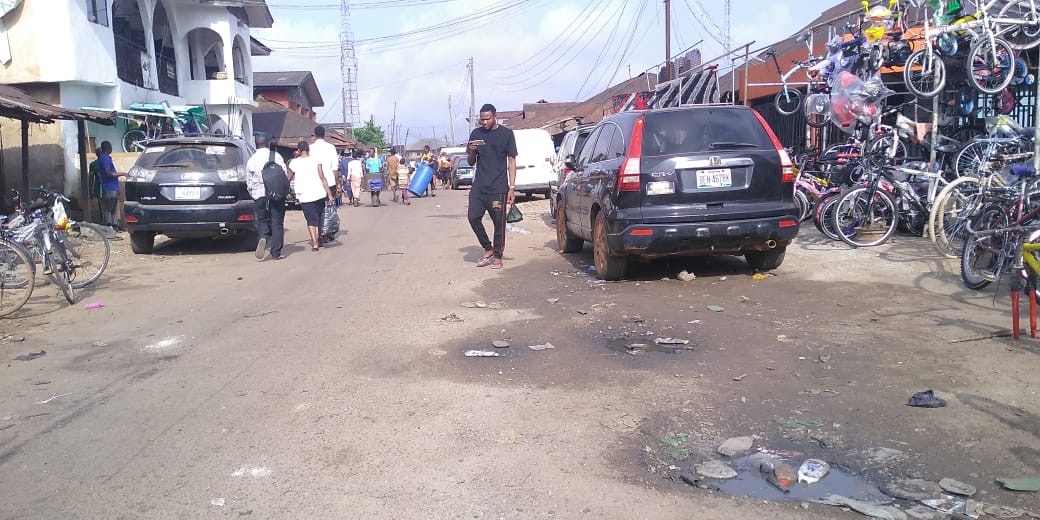By Osaigbovo Iguobaro
The sex trade, like any other business, experiences its share of challenges, successes, and setbacks. Its roots in Edo date back Centuries, with historical accounts tracing its origins to the reign of Oba Ewedo (1255AD-1280AD) in the Benin Kingdom.
During his rule, Oba Ewedo implemented reforms, including the establishment of a Custodial Centre for minor offenders, where special ropes from the settlement of Ugbague were used to restrain criminals awaiting trial.
Over time, Ugbague evolved from a farm settlement for special ropes into a hub for prostitution, attracting women from various backgrounds, including those seeking refuge from failed relationships or pursuing economic opportunities. Many of these women, predominantly above 40-year-old and with children, became breadwinners for their families, utilizing savings from sex work to establish other businesses for long-term financial stability.
However, societal changes and economic pressures have reshaped the landscape of the sex trade in Edo State. Demand for residential space by sex workers has led to families either relocating or converting their homes into mini shops to accommodate the influx of workers. Moreover, the demographics of sex workers have shifted, with younger women employing innovative strategies such as online hookups and provocative displays to attract clients.
Despite these changes, the sex trade in Edo remains fraught with risks, including theft, robbery, and raids by law enforcement. Sex workers navigate these dangers while managing relationships with pimps and ensuring their own safety and their clients.
Centuries after its inception, the sex trade continues to endure in Edo, adapting to evolving societal norms and economic realities, while retaining its core essence as a means of livelihood for many.
Ugbague Street, in Benin City, Edo State Capital, is renowned for various business activities. The area plays host to bicycle repairers, buying and selling of some kinds of household items during the day and a hub for sex trade at night.
Sex workers at Ugbague and environs who pay the sum of N1000 as rents daily to their landlords and landladies, still realize some profit, depending on the number of clients that come into their abode and the bouts of sex they can muster.
It is said that any non itinerant commercial sex worker who default in payment twice, consecutively, will be evicted and have her room sublet her apartment to any prospective sex trader faces sanction by landlords.
Investigation revealed that these sex traders have special doctors who attend to their healthcare, including treatment for prevention of diseases, which are minimized due to strict enforcement of the use of contraceptives by their Clients and healthcare awareness.
Doctors who attend to the health needs of these sex traders get paid either monthly for services or weekly.
For ease of administration, a leader among the sex traders, is chosen and assigned specific roles of a Chair lady. She takes charge of the red light district and ensure that the rights of commercial sex workers are not violated by either security agents or hoodlums who may pose as clients in the line of duty.
In the wake of the Covid-19 outbreak, the Proprietors of Brothels, evicted sex workers at Ugbague, in a bid to prevent the spread of the novel Coronavirus pandemic. But, few months later, they returned back to base. Despite the duty care and due diligence, like, illicit sex trading is prune to hazards like rape, violence etc.
Boom periods for these women of easy virtue are social activities like burials, marriages and assorted festivals. These events allow them to flounder their wealth when they travel to their homes of origin with lots of purchases to celebrate the yuletide with their families in fanfare. At the beginning of the new year, they are back to base after a period of hibernation.
Sex workers who were not able to meet their target, had to pay fine for not attending family meetings and stay behind to continue with their sex trade during the period the demand by clients is higher than the supply variables.
A sex worker who simply identified herself as Miss Isi told this Newspaper that she decided to hang unto the business to fend for herself and siblings who live outside the State.
“There is no job in Nigeria. This is the only thing for now that we could do to survive this economic hardship”, according to Miss Isi.
A landlord in the area who simply identified himself as Mr. Luyi, cited the disparity in cost of renting an apartment, as the reason for the migrations in cost outlays.
He explained that growing up as a Child, he discovered that each prostitute in Ugbague accepts a Farthing in exchange for foreplay and overtime. The charges thereafter went up in line with market forces.
He revealed that currently, a cubicle goes for N1000 daily as fee paid by each sex worker while a tenant that is not into such illicit trade pays either N4000 or N5000 per room for a cubicle.
Luyi, an artist, said despite the money to be made, he abhors prostitution and therefore does not give his apartment to sex workers due largely to his faith as a Christian.
According to him, “I grew up to discover this bicycle sex-work even before the first visit of Queen Elizabeth of England to Nigeria around 1956”.
The Septuagenarian recalled that his forebears told him that some women from Edo Central Senatorial district and the Eastern part of Nigeria were among the first sets of people who occupied the brothels in Ugbague Street several years ago.
He stated that the illicit business was highly embraced by widowers and other lovers, adding cases of rape and defilement in Benin had dropped drastically, according to oral evidence.
He further explained that the commissioning of defunct Emotan Cinema around near Ogiefa Street, marked a turning point in prostitution in Benin City.
Luyi said soon after the Cinema business was established, an Orthodox church that was adjacent to the property which also housed stripped dancers, began to lose grip of its worshippers.
Following the Church inability to meet its monthly obligations to the owner of the property, they were given notice to quit.
According to him, “as soon as the church relocated elsewhere, Emotan Cinema played host to more guest and night life got to its peak. At that time, you could walk at any time of the night. No kidnapping and armed robbery as it is today”.
Few years ago, news broke out about prostitutes fleeing Edo State as the government, led by Governor Godwin Obaseki, initiated a crackdown on prostitution. The state government’s efforts were aimed at eradicating the sex trade, which had been a long-standing issue in the region.
This action followed the state’s commitment to upholding moral standards and promoting a safer environment for its residents. The move also signified the government’s dedication to addressing social issues and implementing policies that align with the values and expectations of the community.
The State government has since taken various measures to combat prostitution, which include campaigns against the practice, denouncing it as incompatible with the state’s culture, and stifling its growth.
For instance it has intensified its efforts to criminalize prostitution-related activities, such as using brothels, soliciting, and deriving income solely from prostitution.
These measures aim to limit the freedom of choice and access to resources for those involved in prostitution, making it difficult for them to report violence or seek legal recourse.
In addition, the Edo State government expressed deep-rooted intolerance for prostitution, with public officials calling for its eradication and condemning those involved in the industry. This stance has led to extreme stigmatization of sex workers, who are often viewed as vessels carrying outsiders into Nigerian culture and principles.
The government’s approach combined elements of both prohibition and decriminalization, with the Criminal Code containing provisions that prohibit certain aspects of prostitution while not explicitly criminalizing the act itself.
Observers say, this system severely limits the freedom of choice and access to resources for those involved in prostitution, making it challenging for sex workers to report violence or seek legal recourse.
Asked why he thinks that it is dangerous to abolish sex-work, Luyi asked, “If they clampdown on prostitutes or apply strict enforcement in criminalization of sex – work, will it make society any better?
“I do not think so because they also helped to curb the anxiety of ‘sex partners’. Most of the prostitutes we have around here are still there today because of patronage. How will you feel as a man if you heard that your wife was raped on his way to the market? This people have helped to reduce cases of rape among our women. I know what I am talking about”, he said.
Continuing, “When television sets became common in many households during the administration of former military Governor of the defunct Bendel State, Brig.-General Ogbemudia, now deceased, cinema faded away into the blues.
80-year-old Landlady in Ugbague Street, Mrs. Florence Amadasun, alleged that sex – work Ugbague Street, had existed several years, before she was born, however differed in her opinion.
She would rather the Government relocate the sex workers or rehabilitate them to become better placed and more useful to society.
Late Mrs. Amadasun who occupied her 3-Bedroom apartment, also expressed worry over the unregulated industry.
“Ogiefa Street was a footpath. I grew up to meet Ugbague Street. Non natives among us started sex-work here. This is my house.
“It is only God that knows what can remove prostitutes from this area. They have increased in number. My anger is that the sex workers, solicit for sex in public, unlike how it use to be several years ago when they take their Clients to a hideout in the corner.
“They should be relocated. The place is no longer safe for us. Strangers are now among them”, she said.
Speaking on the latest trends that are associated with prostitutes, Mrs. Alice Amu, a resident in Ugbague Street, said sex workers who often pose in nude dresses do not entice people from the neighborhood for sexual pleasures, but, visitors especially at night.
“The reason is because we know them and they know us. But, that is not the same way they behave to visitors especially young males”, she said. Praising her Children for not posing a threat to her as a parent, despite her concern about the human interaction and influence for young female children”, she said.
*Mrs. Orobator, a resident of Ugbague Street, explains in this interview about how the red light district has evolved over the years
MRS. OROBATOR: This place is known as forest. As the name implies, the whole area was a forest back in the day of yore.
MRS. OROBATOR: The area is called Igbaghague – a Benin name for a place where certain trees with strong ropes are found. The name of the rope is called Igbaghague, which was later corrupted to Ugbague.
MRS. OROBATOR: Anytime they wanted to tie up any criminal at the palace of the Oba, the Oba sends his servants to the area to get the rope called ague – rope in Edo language. The ropes are used to bind the criminals during the reign of Oba Ewedo who first gave the title of Orobator of Benin. Orobator, connotes being available for a long time for the Benin throne.
MRS. OROBATOR: Over the years, development came to the area, poachers relentlessly dealt with the species of trees that produce the ropes before they went into extinction at Igbaghague.
MRS. OROBATOR: After sometime, businesses started sprouting at Igbaghague area, traders mainly from the Esan people and after which other natives became attracted and began to come from their villages to trade in the area.
MRS. OROBATOR: The women traders who came were beautiful and very attractive.
MRS. OROBATOR: So, whenever they bring their goods and wares to Igbaghague, some Benin men patronized them, sleep with them in exchange for money.
MRS. OROBATOR: So, when some of the women return to their homes, they will tell their friends and close confidants about the profit they got from their sideline sex for money businesses secretly. Ahead of the next trip, the women will invite their friends to travel with them to sell goods, take a look at the profit that came out of the “double take businesses.
MRS. OROBATOR: Consequently, the traders began to introduce their friends and family members to accompany them to trade at Igbaghague.
MRS. OROBATOR: After a period of time, some of the women began to rent rooms beside the market where they pass the night, and have fun at night before returning home the following day or the next few days, as the case may be.
MRS. OROBATOR: More Benin men including widowers and others often went there for relaxation. Some of the women who found Igbaghague as home, did not return to their places of aborigine.
MRS. OROBATOR: That name Igbaghague was to be later corrupted after sometime to Ugbague.
*QUESTION: What has changed between decades ago and today?
MRS. OROBATOR: If you were coming from King square to Ugbague, at that time, you would tell the driver to stop you at “Ugbague”; Everyone in the vehicle will look at you scornfully.
MRS. OROBATOR: Their thinking will be that maybe the individual, especially if she is a female, is probably one of the harlots or gay to the place to prostitute or sleep with men.
MRS. OROBATOR: There was a day when I was going home on a certain day, the conductor of the bus said stop at Italy junction. He was just making jest of the whole situation, a reference to the new prostitution base of Edo persons n modern times, in Italy.
MRS. OROBATOR: I graduated from the University of Benin (UNIBEN). Back then in school, one of my lecturers jokingly told us, when we went to his office to get money from Ugbague to buy books if we wanted money.
MRS. OROBATOR: Then, I never knew that people live at Ugbague or sell bicycles and do other kinds of businesses aside from prostitution until I got married.
MRS. OROBATOR: Remember that Ugbague is the biggest market in Edo State.
*QUESTION: As a mother and a parent what does it require to raise children/family at Ugbague?
MRS. OROBATOR: This is danger zone. Raising a child has required a lot of care and attention. You have to put in your best to be able to guide your children because the boys in this area who come to patronize the prostitutes could become a threat.
MRS. OROBATOR: Your children particularly the female children when they see that your daughter is growing up or has attained the age of puberty, they may want to entice her with money just to sleep with her, so, every parent has to be extremely careful.
MRS. OROBATOR: If you are putting 40 percent in monitoring your child, especially when you are living close to the red light district, you have to put in 99.9 percent so that your children will be guided or else, if you take your eyes off the ball, your child could derail. I will not lie. Raising a child in this area is difficult. You cannot compare it with other areas. However, the narrative about Ugbague brings exposure to the child.
MRS. OROBATOR: A child that understands that wise counsel of parents could help to shape their lives will be focused in life. If the child goes out, he or she will not be misled by either peer influence or acquire negative behaviour from women of easy virtue in the neighborhood because of the exposure.
MRS. OROBATOR: Here, you find criminals and prostitutes. Sometimes – you have people running helter skelter during broad day light. You lock door. Sometimes, it could be that the police are raiding the prostitutes locations or searching for the hideout of criminals. Our children are exposed. A child of 15 in this area is more exposed than a child of 17 elsewhere, that may never have heard gunshot since he or she was born. When my 6-year child sees everybody running, all she does is to quickly go inside and lock the doors.
MRS. OROBATOR: Everybody is security conscious in this area because of the kind of bad elements that live with us.
*QUESTION: What has been your unforgettable moments/regrets living in this area since you started living at Ugbague?
MRS. OROBATOR: May be because my husband has stayed here for long, the people here are friendly to us. They are nice to me. I have not had any sad encounter with anybody.
MRS. OROBATOR: The only challenge is when the police come to raid the area – everybody is running helter-skelter. You know the Nigeria police if you are caught during raiding, you will have yourself to blame, after undergoing unnecessary questioning and torture. That is the major bad experience, but in terms of people who are living here, I have never really had any negative encounter. The prostitutes are nice people. Their own concern is that everyone should mind their business, while they mind their own. Do not interfere in their lime of trade.
MRS. OROBATOR: We have never had of incident of rape in our neighborhood. If they guys need any sexual pleasure, they pay and get it. Some innocent people are arrested during police raid. That is what I do not like. As you are walking along the road, they can just pick you. So you do not have to wait. The boys here are protective of us here. There was a time I had an encounter with a bus driver and in the process was assaulted on my way.
After a minor argument, what enraged the youths was when the driver called me a “prostitute”. The boys in the area rose in my defense and said I know this woman. She is a married woman. They dealt with the driver, consequently.
MRS. OROBATOR: For me, it’s a nice experience living at Ugbague.
*WHY IS IT DIFFICULT FOR PEOPLE TO SECURE RESIDENTIAL APARTMENT AT UGBAGUE?
MRS OROBATOR: Most people use Ugbague as business centre. The demand for stores is higher than demand for residential apartments.
*WHY IS UGBAGUE NOT A PREFERRED DESTINATION FOR SOME FAMILIES?
MRS. OROBATOR: People do not want to stay and raise their children here. I do not share in their fear because where I live is a traditional house, that of Chief Orobator.
MRS. OROBATOR: The prostitutes have their zone. They do not cross the borderline. They have their space, that is carved out for them.
MRS. OROBATOR: The reason why shops are of high demand at Ugbague is because it’s close to the heart of Benin City. Most of the buildings behind are where people store their goods.
MRS. OROBATOR: There is then limited space for residents. Shop owners pay higher than a private residents.








Leave a Reply